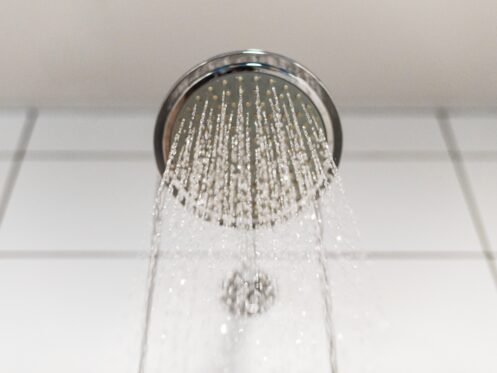Low water pressure can be a pain, especially if you are trying to shower, wash dishes, or use a garden hose. Several things can lead to low water pressure, ranging from simple causes to costly failures. If you are experiencing low water pressure, start small and rule out anything that doesn’t require a plumber. If you’ve done this and you still have low pressure, you’ll need a professional plumber to find the cause and make repairs, allowing you to enjoy the full force of water again.
Water Being Used Elsewhere in Your Home
If you suddenly notice a drop in water pressure, the first cause to consider is that someone else is running water elsewhere in the house. Check and see if the washer or dishwasher is running. Perhaps someone is running water in the sink or taking a shower. You might even want to check your outdoor water taps and see if someone is watering the garden or lawn. The drop in water pressure should be temporary until the other water outlet is off. If you look around the house and do not find any other water running, and the water pressure is still low, you have a different problem.
The next step to diagnosing water pressure issues is to check with your water supplier or neighbors. If crews are nearby working on water mains, sewer lines, or other parts of the plumbing grid, you may experience fluctuating water pressure. Check with your water company to see if they know of any work in the area that may cause low water pressure in your home. If they are unaware of the cause, check with your neighbors. If multiple homes in the same neighborhood are experiencing problems with water pressure, you’ll need to report this to the water company so they can send someone to look for the cause.
1. Examine Water Shut-Off Valve
Your main water shut-off valve is usually inside your house where the main water supply enters. Rarely is it found outside of the house. If you have had recent plumbing work done or have shut the water off for some other reason, you should check this valve when experiencing low water pressure. If the valve is not completely open, you aren’t getting full water flow into your pipes.
This valve will have a round knob or a lever. If your valve has a round knob, turn it counterclockwise as far as it will go. If you have a lever, turn it until it is parallel to the pipe.
Another thing you can check is the water meter valve. This valve directs and monitors the water flowing into your home. The water meter valve is usually buried underground and is not easily accessible. If you have reason to suspect there is an issue with this valve, you’ll need to contact your water supplier. It is rare for anyone to handle this valve at all unless you’ve just recently had your water turned back on by the water company.
2. Check for Leaks
Now that you’ve crossed off the temporary issues that do not require a professional plumber, it’s time to look at more complex plumbing problems related to low water pressure.
The first thing a plumber will look for when experiencing low water pressure is a water leak in your pipes. When the water coming into your home is leaking out before hitting the tap, you’ll likely notice low water pressure. Because many of your pipes hide behind walls, under the floors, and above the ceilings, you probably won’t spot a leak until it becomes a disaster. Leaky pipes happen for many reasons and are far more likely if you own an older home and have not upgraded your plumbing.
Common indications of a water leak in your pipes include:
- Wet spots or water stains on the ceiling, floor, or wall
- Bulging ceilings where water has pooled
- Sudden and dramatic increase to your water bill
- Mold and mildew growth in areas that should be dry
If you suspect a water leak in your home, you’ll need a professional plumber for leak detection services. Our professional plumbers use advanced skills and expert knowledge to inspect your plumbing system and find the leaky culprit. After identifying the problem pipe, the plumber will make repairs to stop the water from leaking. The plumber may be able to patch the leak or replace a portion of the pipe. If you have a leaky joint, the plumber may be able to replace that piece to stop the leak. Pipes that are extremely old or damaged may need to be replaced completely.
3. Inspect for Clogs
The next thing your plumber can check for is clogs in your pipes. We usually associate clogs with drains, but a clog can form anywhere in your pipelines. If you have a blockage in your pipes, it could cause water to trickle rather than gush through your faucets.
A professional plumber is the only person who should attempt to clear clogs from your pipes. We have specially trained plumbers to hunt down blockages and remove them without causing more extensive damage. Chemical drain cleaners are caustic and may erode your pipes. Mechanical implements can puncture or damage pipes when used by an untrained person. Our plumbers use special equipment to locate any areas of concern, allowing them to inspect pipes you cannot see.
The plumber will clean and clear your pipes using high-pressure water called hydro-jetting. This process forces water through the pipes, breaking up any clogs in the way and moving debris and foreign matter out of your system. Hydro-jetting can also be used as a preventative measure to keep drains clear of obstructions to prevent plumbing problems from happening in the first place.
4. Faulty Fixtures
If you have low water pressure in only one fixture, such as the kitchen sink or the shower, but not all, the problem is likely with the fixture itself rather than a whole-house plumbing problem. You may have a blocked aerator that causes the water to come out more slowly than it should. You can remove the aerator to clean it, removing any debris and mineral buildup. If this does not fix the issue, you may need to consider replacing the entire fixture.
Dealing with low water pressure can be a difficult experience. If you’ve run through the list of easy fixes and you still have a problem, it’s time to reach out to Plumbing & Cooling Nerds for a professional plumber to help. Our plumbers specialize in household plumbing, leak detection, and repiping, offering you a comprehensive selection of services in Southwest Florida. We take pride in completing your plumbing jobs with professional, courteous, and prompt service, leaving you with peace of mind that your plumbing is in the best shape possible.
For help with your low water pressure problem or other plumbing services, call the experts at Plumbing & Cooling Nerds today.

